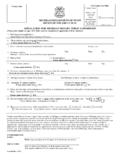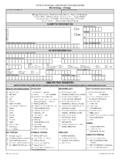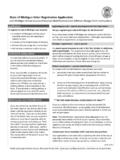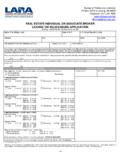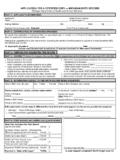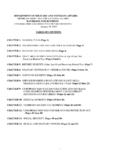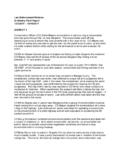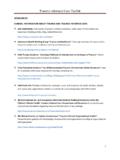Transcription of E-Notary and Remote Notary Guide - Michigan
1 1 OGS 11/19 STATE OF Michigan Electronic and Remote Notarial Acts Michigan Law on Notarial Acts (MiLONA) GENERAL INFORMATION Guide Michigan significantly amended its laws concerning notarial acts in 2018. The goal of the amendments was to bring Michigan s laws ins sync with other states that have authorized electronic and Remote notarizations. To do this, the laws were amended to provide for definitions related to electronic and Remote notarizations and authorize the Secretary of State with the assistance of the Department of Management and Budget to allow vendor systems and platforms to be used in Michigan to conduct electronic and Remote notarizations.
2 The State does not provide a system or platform for use. It is important to note that a Notary public s duties and responsibilities have changed very little and only in a way that supports the new electronic and Remote notarization technologies. The Notary public remains the key point of integrity in our society and is responsible for knowing and understanding the laws as they are written and how to properly conduct the business of a Notary public. While the effect on the Notary public s responsibilities has not changed, the method of how the notarial act can be performed has changed. With the addition of electronic and Remote notarial acts, the law essentially adds new statuses to the Notary public commission.
3 A commissioned Notary public can now be thought of as having three potential statuses and can perform the following types of notarizations: and Paper Notarizations (applies to all commissioned notarypublics) Notarizations (sometimes referred to as an E-Notary ) Notarizations (sometimes referred to as a Remote Notary )Traditional/pen and paper notarizations have not been affected by the changes. An electronic or e- notarization, the notarization uses digital signatures but must occur in the physical presence of the Notary , like a traditional/pen and paper notarization. 2 In Remote notarization, the person is not in the physical presence of the Notary but is present through audio and visual equipment such as a webcam.
4 Electronic signatures are used to complete this process as well. To become eligible to conduct electronic or Remote notarizations there are three essential steps that must be met: the process to become commissioned as a Notary public in Michigan ; ifyou are not currently commissioned as a Michigan Notary Select and purchase an electronic notarization system/platform from theSecretary of State s Approved E-Notary and Remote Notary Public Vendorslist. A vendor must be on the list to be used in : You must work with the vendor to purchase the system/platform. This isnot something that our office can assist you our office with the name, contact information and system/platform oncepurchased: Request for Duplicate/Notice of Change (if currently a Notary public) or Notary Application and Instructions (if new or renewing applicant)Once the Secretary of State has been notified of a commissioned Notary public s approved vendor system/platform choice(s), it is acceptable to perform the notarial acts electronically or remotely as appropriate.
5 This means that before performing the first electronic or Remote notarial act the information must be on file with our office The Michigan Department of State provides training on the requirements and duties of a Notary public but cannot provide any assistance with choosing or using a vendor supplies electronic or Remote Notary system or platform. Contact the vendor for information on training and assistance. QUESTIONS AND ANSWERS What effect does the new law have on a Notary public s responsibilities and commission? The amendments to Michigan s Law on Notarial Acts affect how notarial acts can be performed rather than the Notary public s responsibilities and commission.
6 A Notary public s duties and responsibilities have changed very little and only in a way that supports the new electronic and Remote notarization technologies. The Notary public remains the key point of integrity in our society and is responsible for knowing and 3 understanding the laws as they are written and how to properly conduct the business of a Notary public. While the effect on the Notary public s responsibilities has not changed, the method of how the notarial act can be performed has changed. With the addition of electronic and Remote notarial acts, the law essentially adds new statuses to the Notary public commission. A commissioned Notary public can now be thought of as having three potential statuses and can perform the following types of notarizations: 4.
7 Traditional/Pen and paper Notarizations (applies to all commissioned notarypublics) Notarizations (sometimes referred to as an E-Notary ) Notarizations (sometimes referred to as a Remote Notary )What is a traditional/pen and paper notarization? A traditional/pen and paper notarization is conducted without the aid of electronic or Remote notarization software. This is the way all notarizations took place prior to the implementation of electronic and Remote notarization methods. The requirements for performing traditional/pen and paper notarizations have not changed. What is an electronic or e-signature? While the definition of an electronic or e- signature is quite broad as provided in the Michigan Law on Notarial Acts (MiLONA), for our purposes an e-signatures is a process that is attached to or logically associated with a digital representation of one s actual handwritten signature executed by the individual with the intent to sign the record.
8 What is an e-notarization? An e- notarization is similar to a traditional/pen and paper notarization inasmuch as the signer appears before the Notary , except in an electronic notarization the document being notarized is digital and the Notary uses electronic signatures. An example of this is signing and initialing at the bank or doctor s office using a stylus and pad. What is a Remote notarization? A r emote notarization is conducted through audio and visual equipment; the signer is not in the physical presence of the Notary public. The notarization itself is considered an e-notarization as the document being notarized is digital and the Notary uses electronic signatures.
9 4 What is the difference between an e-notarization and a Remote notarization? There are a few differences, but the main difference is how the documents are notarized and signed. In e- notarization, the notarization uses digital signatures but must occur in the physical presence of the Notary , similarly to a traditional/pen and paper notarization. In Remote notarization, the person is not in the physical presence of the Notary but is present through audio and visual equipment such as a webcam. Electronic signatures are used to complete this process as well. How do I become eligible to conduct electronic and/or Remote notarizations? The process for eligibility to conduct electronic or Remote notarizations is the same.
10 There are three essential elements that must be met: the process to become commissioned as a Notary public in Select and purchase an electronic notarization system/platform from theSecretary of State s Approved E- Notary and Remote Notary Public Vendorslist. A vendor must be on the list to be used in : You must work with the vendor to purchase the system/platform. This isnot something that our office can assist you our office with the name, contact information and system/platform oncepurchased: Request for Duplicate/Notice of Change (if currently a Notary public) or Notary Application and Instructions (if new or renewing applicant) Once the Secretary of State has been notified of a commissioned Notary public s approved vendor system/platform choice(s), it is acceptable to perform the notarial acts electronically or remotely as appropriate.
